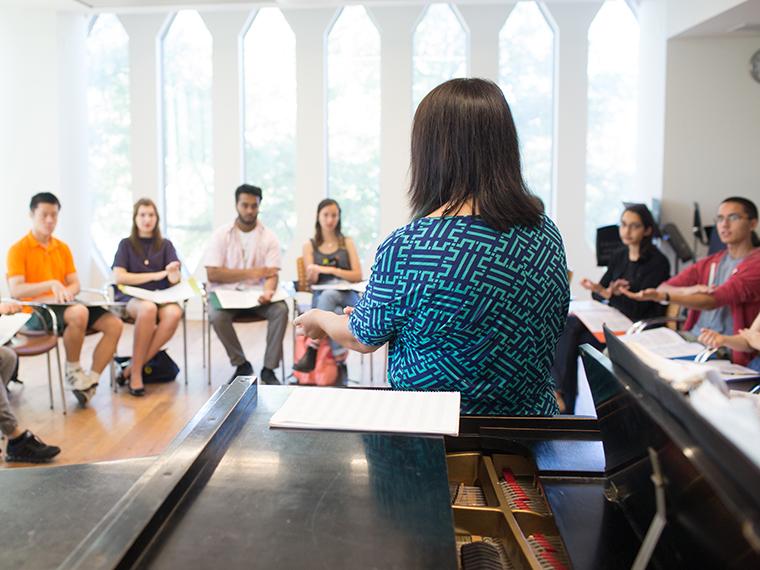
11 Dec Oberlin College Creates Half-Dozen New Programs
 In fall 2020, Oberlin College will introduce five new programs of study that transcend traditional institutional boundaries and establish a new level of collaboration between the College of Arts and Sciences and the Conservatory of Music. These new programs will offer Oberlin students innovative educational opportunities which will help them build successful, 21st century careers in a host of fields including music, visual arts, media, science, and business.
In fall 2020, Oberlin College will introduce five new programs of study that transcend traditional institutional boundaries and establish a new level of collaboration between the College of Arts and Sciences and the Conservatory of Music. These new programs will offer Oberlin students innovative educational opportunities which will help them build successful, 21st century careers in a host of fields including music, visual arts, media, science, and business.
Drawing on Oberlin’s deep strengths in music and the liberal arts, students will have the opportunity to minor in Music and Cognition, Music and Popular Culture, Interdisciplinary Performance, and Arts and Creative Technologies. A fifth program, in Arts Administration and Leadership, will add co-curricular programming in an integrative concentration. All five are available to all Oberlin students.
“We are fully leveraging Oberlin’s unique resources to bring what only Oberlin can to interdisciplinary studies, preparing our graduates for the types of careers they will have in the 21st century,” says President Carmen Ambar. “This collaboration, embraced by our faculty, captures the spirit and opportunity that shape the innovative work taking place under the banner of One Oberlin.”
Conservatory students already take advantage of courses offered in the College of Arts and Sciences virtually every semester of their Oberlin experience. For the first time, those conservatory students now will be able to complete minors in the college as well. College and conservatory faculties are also considering a minor that would allow students in the Arts and Sciences to minor in music.
The new offerings complement Oberlin’s existing robust opportunities to pursue their education in both the college and the conservatory, including the Double Degree Program. Attainable in five years or fewer, the Double Degree was created at Oberlin more than 100 years ago and continues to serve as a worldwide model for interdisciplinary education.
The newly introduced interdisciplinary areas of study include:
Music and Cognition immerses students in the exploration of cutting-edge issues in the cognitive science of musical experience—how music gets inside our heads and influences our thoughts and feelings. Viewed from the perspectives of music creation as well as music appreciation, this minor draws heavily upon the resources of existing departments in Psychology, Neuroscience, Philosophy, Anthropology, and the conservatory’s Division of Music Theory.
Music and Popular Culture emphasizes the study of music’s effect on mainstream cultural practices throughout history, as well as the impact of cultural factors on music from a given era or region of the world. Existing departments and programs leveraged for this minor include Africana Studies, Music History, Ethnomusicology, Sociology, and Art.
Interdisciplinary Performance encourages students to explore creativity through a broad range of performance practices and study of subjects related to performance, including audience interaction, improvisation, and dynamics among performers. This minor incorporates departments and programs such as Art, Cinema Studies, Creative Writing, Dance, Theater, Opera Theater, and Technology in Music and Related Arts (TIMARA), as well as athletics and various applied studies courses in the conservatory.
Arts and Creative Technologies focuses on participation in global conversations about the expressive potential of technology old and new. This minor emphasizes Oberlin’s plentiful opportunities in both the college and conservatory for study of the arts, media, and technology, most notably through the departments of TIMARA, Computer Science, Cinema Studies, and Studio Art.
Arts Administration and Leadership is an integrative concentration that examines curricular pathways toward administrative careers across a variety of artistic fields, from museum administration to rock band management to the film industry. Departments and programs at the core of this concentration include Economics, Theater, Rhetoric and Composition, and the conservatory’s Division of Pedagogy, Advocacy, and Community Engagement (PACE).
Read the full article at Oberlin College’s website.






